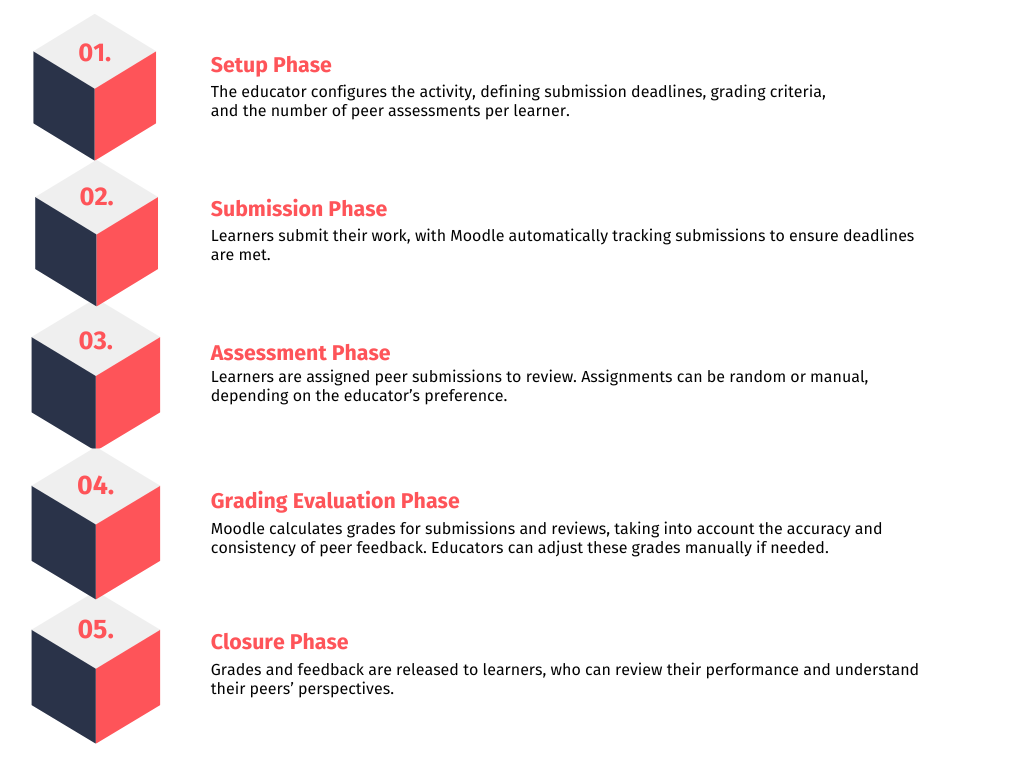Moodle, one of the most versatile open-source learning management systems, offers a wide array of tools to encourage collaborative learning. Among these, the Workshop activity stands out as a powerful tool for peer assessment and feedback. By enabling learners to evaluate and provide constructive feedback on each other’s work, the Workshop activity promotes critical thinking, reflection, and a deeper understanding of the subject matter.
Why It Matters
The Workshop activity transforms assessment into an interactive and collaborative process by integrating peer feedback into the learning journey. Whether used for creative projects, research reports, or problem-solving tasks, Moodle’s Workshop activity provides an ideal platform for peer feedback and collaborative assessment.
Here, we explore how Moodle’s Workshop activity supports assessment, detailing its features, benefits, and practical applications.
What is the Workshop Activity?
Moodle’s Workshop activity is a unique module that combines the submission of learner work with peer assessment. It’s designed to create a structured process for students to both give and receive feedback, fostering engagement and collaborative learning.
How it works
Submission Phase
Learners upload their work, which could be essays, projects, or any other artefact.
Assessment Phase
Students evaluate peer submissions based on predefined criteria set by the instructor.
Grading and Feedback
Moodle calculates grades for both the submission and the quality of peer reviews, providing learners with actionable insights into their own performance.
Benefits of Peer Feedback Using the Workshop Activity
Fosters Critical Thinking and Reflection
Engaging in peer review encourages learners to critically evaluate others’ work, honing their analytical skills and reinforcing their understanding of the subject matter.
Promotes Accountability and Engagement
Knowing that peers will review their work motivates learners to produce higher-quality submissions. Similarly, providing peer feedback fosters a sense of responsibility and active participation.
Enhances Understanding Through Diverse Perspectives
By evaluating peer submissions, learners are exposed to different approaches and ideas, broadening their understanding of the topic.
Develops Communication Skills
Constructive peer feedback requires clear communication. The Workshop activity helps learners practice articulating their thoughts and providing actionable suggestions.
Key Features of Moodle’s Workshop Activity
Customisable Assessment Criteria
Educators can define detailed rubrics or marking guides for assessing submissions. This ensures consistency and helps students understand expectations.
Anonymous or Identifiable Reviews
For sensitive topics, reviews can be made anonymously, encouraging honest and unbiased feedback. Alternatively, identifiable reviews foster accountability and open dialogue
Flexible Grading Strategies
Workshop supports several grading methods, including:
- Accumulative Grading: Assign points based on multiple criteria.
- Comments-Only Feedback: Focus solely on providing qualitative feedback.
- Rubric-Based Grading: Use a structured rubric with pre-defined performance levels.
- Number-Based Grading: Assign numerical scores to specific aspects of the work.
Self-Assessment
Learners can assess their own work alongside peer evaluations, encouraging self-reflection and a deeper understanding of the grading criteria.
Integrated Feedback
Moodle compiles peer feedback and instructor comments into a comprehensive report for each learner, providing actionable insights for improvement.
Workshop Phases: A Step-by-Step Process
The Workshop activity unfolds in five phases, ensuring a smooth and structured workflow:

Practical Example: Implementing the Workshop Activity
Scenario
A creative writing course uses the Workshop activity to evaluate short stories.
Step 1: Setup Phase
The instructor creates a Workshop activity, uploading a sample story as a reference and defining a rubric with criteria like narrative structure, creativity, and language use.
Step 2: Submission Phase
Students submit their short stories. Moodle automatically tracks submissions and locks the phase once the deadline passes.
Step 3: Assessment Phase
Each student is assigned three peer submissions to review. Using the rubric, they evaluate the stories and provide comments on strengths and areas for improvement.
Step 4: Grading Evaluation Phase
Moodle calculates scores for each submission and adjusts grades based on the quality and fairness of peer reviews. The instructor reviews the grades for accuracy before finalising them.
Step 5: Closure Phase
Learners receive a report with their grades and compiled peer feedback, helping them understand their strengths and areas for growth.
Conclusion
Moodle’s Workshop activity empowers educators and learners alike by transforming assessment into a collaborative and engaging experience. By fostering critical thinking, clear communication, and meaningful peer feedback, it helps learners deepen their understanding while building valuable skills. Whether you’re evaluating creative projects, research reports, or problem-solving exercises, the Workshop activity provides the structure and flexibility to inspire success in every learning journey.
Want to see Moodle’s Workshop activity in action?
Join our Feature Focus webinar series to discover how peer assessment can empower your learners and enhance engagement. Our expert eLearning consultants will guide you through live demonstrations, sharing practical strategies you can use straight away to unlock the full potential of your learning management system.
Explore More Features to unlock your platforms potential

